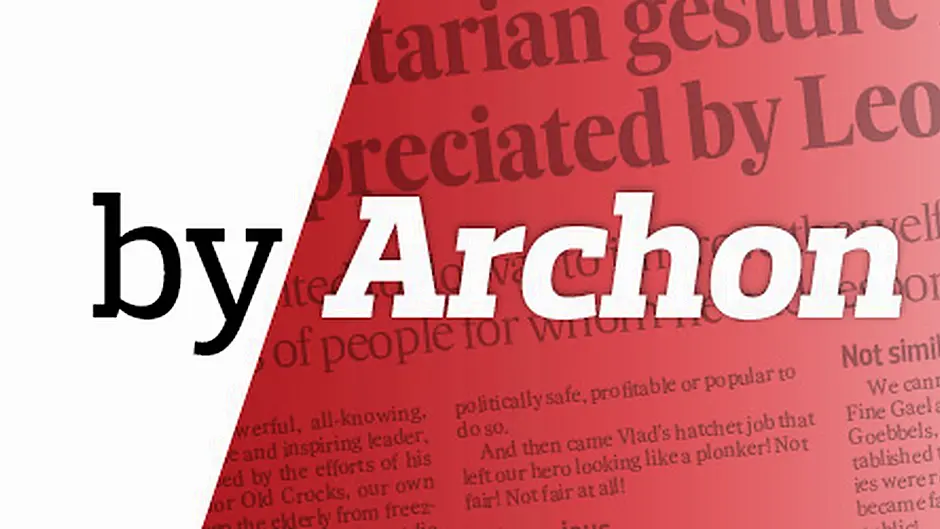No self-respecting Traveller would use it to refer to one of themselves and, in fact, it very much belongs to the language of social discrimination, favoured by those who always have been prejudiced.
YEARS ago, a zany professor at UCC ordered her first-year students to read Ernest Gowers’ pamphlet, Plain Words, which was about ‘writing correctly’ – a notion that seemed extraordinarily exotic to country boys whose reading experience at that time extended no further than The Beano.
If memory serves us right, we all boasted a pass in Leaving Cert English and saw no reason to take on board something that dealt with the complexities of the English language, such as clichés, jargon and correct grammar.
Inevitably, their response was a cry of indignation: ‘What in the name of Gawd is that wan on about?’ they howled before throwing their hat at her advice and embarking on the inevitable pilgrimage to Starry’s on the Western Road where they could repress or ignore their bewilderment in an alcoholic pool of ignorance.
And then, quite by accident, we recently came across a copy of Gowers’ book and discovered that its purpose was easily understood: to promote the virtues of a clear, uncomplicated style in writing.
Nothing wrong with arguing in favour of proper syntax and good word choice, we thought!
Indeed, after listening recently to the Dáil wannabes who have been criticised by the media on account of their linguistic failings, we realised a perusal of Gowers’ would be of immense benefit to that class of people.
We also were reminded of the misfortunes of a Fianna Fáil lassie who had some difficulties with the knock-on effect of an ill-judged tweet. Ten years ago, she upset members of the travelling community by referring to them as ‘knackers’ after they stole her car.
Spoofers’ den
Recently, Fine Gael pedlars of the black arts resurrected the incident and excoriated the good lady for her dreadful lack of judgement back then. They triumphantly waved the tweets under her nostrils, declaring that despite the passing of time she would never be a fit person to grace the hallowed chambers of Dáil Éireann – yes, that very den of spoofers and wasters!
Even our usually gracious Taoiseach, Vlad the Impaler, couldn’t help licking his chops at the opportunity of indulging in a risk-free bout of finger pointing at Mickey’s Soldiers of Destiny.
And with a classic twist of the knife, he also took apart the Fianna Fáil tweets: ‘They were sent by a qualified solicitor, a woman in her 30s and they certainly were not becoming of someone who was that party’s representative,’ he hissed.
But, Vlad temporarily forgot that when it comes to nasty politics, what’s good for the goose is also good for the gander, and it wasn’t long before he in turn was filleted. Dragged once more into the open was the 2014 cold case of the fragrant Blueshirt lady-politico who, in a letter to her Dublin constituents, expressed ‘delight’ that plans for a Traveller housing scheme in their neighbourhood had been scrapped.
Immediately, as if time had stood still, the Proper Attitude Brigade in Fianna Fáil sought a statement from Vlad as to whether he still approved of her antique comments.
Vlad ate humble pie and contritely said that the lady now accepted fully that what she said all those years ago was ‘wrong.’ He hastened to add that the incident was dealt with ‘then’ (2014) and didn’t unduly worry him ‘now’ (2019). The Fianna Fáil remarks, however, which were made in 2011, did!
The mind boggles at the hypocrisy of it all!
Offensive words?
Clearly the use of unambiguous, non-political, non-judgemental language acquires a special importance at election time so, in pursuit of Mr Gowers’ recommendations for ‘writing correctly’, we availed of the services of the BBC which has a list of words that have to be used with extreme caution.
For instance God was the least-offensive word to any group whereas Jesus, as an expression of indignation or anger, was considered a mild, everyday word.
In the category of body parts / body functions, arse was not offensive, nor was bum. The BBC also considered crap, fart and knob to be mild and not offensive (People in this country, however, might think differently!).
Within the ambit of mental illness, broadcasters were urged to avoid retard (it effectively refers to a disability). Other dodgy words included schizo and spastic.
Under the heading of sexual orientation, dyke, faggot and queer were considered offensive in certain circumstances. Everyday words such as pissed (drunk) or piss off (go away!) were not deemed to be seriously offensive.
B..tard for some people was very strong and offensive, as was Bi.ch (to be avoided at all costs).
Sh.g was moderately to strongly offensive, as were bonk and bugger. The BBC needless to say, considered the ‘F’ word very offensive and to be avoided.
Urged caution
It also encouraged writers to be particularly careful with terms that fell within the category of racial-religious abuse. For instance, the term chinky-chonk (Chinese restaurant) was not to be used under any circumstances, nor words that might indicate racial abuse, such as nigger, paki and papist (Papist but not Prod?).
As for the word ‘pikey’, which was popularised in the film ‘Snatch’ and starred Brad Pitt as an Irish Traveller, the success of the film did not take the sting out of the word and, in Britain, it remained a harsh term of abuse for describing people suspected of removing lead from roofs, robbing old peoples’ houses, and doing dodgy tarmac jobs.
Quite rightly, the Travelling community considered the term to be offensive. Some years ago, a Formula One commentator got into a spot of bother after he used it in a television broadcast. Referring to repairs being made to the track, he said: ‘There are some pikeys out there putting down new tarmac at Turn 10. Are they out of the way yet?’
The word ‘pikey’, however, is not new. The Oxford English Dictionary states it was first used in print in The Times in 1837, when reference was made to people who had come to the Isle of Sheppey to work in the harvest. It had the meaning of ‘turnpike traveller’ or vagabond.
It’s now a term of abuse in Britain and its use can be deemed a racist offence because of its association with Irish Travellers who, for their part, consider it a most offensive word to throw at them. Linguists suggest that use of the word is intended to mark out Travellers as people who are ‘sub-proletarian.’
No self-respecting Traveller would use it to refer to one of themselves and, in fact, it very much belongs to the language of social discrimination, favoured by those who always have been prejudiced.









